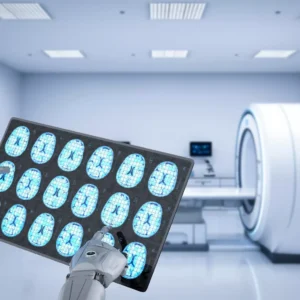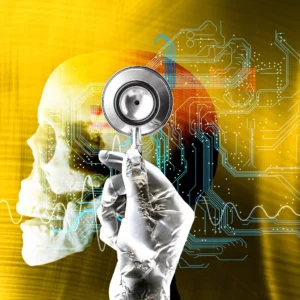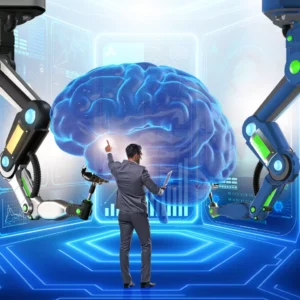
Navigating the Next
AI's Role in Healthcare Predictive Analytics
Healthcare is undergoing a transformative change, and at the heart of this revolution is Predictive Analytics powered by Artificial Intelligence (AI). Imagine a world where a patient’s health status, risks, and outcomes can be predicted accurately.
With machine learning models, we’re inching closer to personalized treatment plans tailored to individual needs. This optimizes costs and is pivotal in reducing hospital readmissions and enhancing early disease detection.
Yet, with such technological advancements come data privacy concerns that the industry cannot overlook.
Dive with us into this enlightening journey, where we’ll explore case studies, innovative software tools, and the promising horizon of AI in healthcare predictive analytics. Prepare to navigate the next in patient care!
Table of Contents
Introduction to Predictive Analytics in Healthcare
Predictive analytics, a transformative tool in healthcare, leverages data to forecast trends, pinpoint risks, and help make informed decisions. The spotlight is on AI’s role in healthcare predictive analytics, where intelligent systems analyze vast arrays of information to spot potential health issues before they escalate.
As we delve deeper, we discover the myriad benefits of predictive analytics in healthcare. Imagine a hospital environment where data works around the clock, offering insights into patient care, optimizing operations, and even suggesting personalized treatment plans. This concept is no longer far-fetched; it’s a reality reshaping patient experiences today.
The machine learning models are the powerhouse behind this analytical prowess, driving early disease detection and fostering tailored health interventions. From predicting healthcare costs to reducing hospital readmissions, predictive analytics are a sentinel, ensuring efficiency and foresight in patient care.
Yet, as we stand on the cusp of a healthcare revolution, we must note the importance of data privacy in healthcare analytics, a topic we will explore in subsequent sections.
Join us as we unearth the potential and opportunities enshrined in AI’s role in healthcare predictive analytics, setting a new benchmark in patient care for generations to come.
Future of AI in Patient Care Predictive Analytics
As we gaze into the future, one thing becomes evident: AI’s role in healthcare predictive analytics is set to expand exponentially. While today’s advancements feel revolutionary, they’re merely the tip of the iceberg.
Imagine a world where AI doesn’t just suggest treatments but can also predict a patient’s entire health trajectory. By analyzing genetics, environment, and lifestyle, personalized treatment plans will evolve dynamically with individuals, preempting diseases even before they manifest. This is the future of patient care predictive analytics.
Furthermore, as machine learning models refine, we can expect a fusion of AI with other emerging technologies like augmented reality and the Internet of Medical Things (IoMT). This synergy could facilitate real-time patient monitoring and immediate AI-driven interventions in clinical settings and at home.
However, ethical and data privacy considerations will become even more pronounced as AI grows autonomous. Constant evolution in data privacy concerns in healthcare analytics will be needed to keep pace.
The future beckons a healthcare paradigm where AI isn’t just a supportive tool but an integral part of the patient care continuum. And as this future unfolds, it promises a healthcare landscape that’s not just reactive but profoundly proactive, all thanks to the unparalleled prowess of predictive analytics.
The Role of Machine Learning and AI
In healthcare, AI’s role in predictive analytics is like the captain steering a ship through uncharted waters. Machine learning, a subset of AI, particularly stands out in this journey. How? By continuously learning from data and refining its algorithms to predict patient outcomes with increasing accuracy.
The beauty of machine learning models for patient predictions lies in their adaptability. Unlike traditional systems, they evolve. Every patient interaction every medical record, enhances their predictive precision. In doing so, they become potent tools for early disease detection, understanding patient health trajectories, and even preemptively identifying potential complications.
Moreover, AI’s prowess extends beyond mere predictions. It’s playing a transformative role in personalized treatment plans. For instance, AI algorithms can analyze a patient’s medical history alongside the latest research, guiding healthcare providers towards the most effective treatment paths tailored to individual needs.
When discussing AI’s role in healthcare predictive analytics, we discuss a paradigm shift from reactive care to proactive, data-driven insights. It’s the dawn of a new era where AI and machine learning in healthcare are not just tools but invaluable allies, continuously working to improve patient outcomes and redefine the future of healthcare.
Personalizing Patient Care
As the age-old saying goes, “One size doesn’t fit all.” This resonates profoundly in healthcare, where individual uniqueness demands bespoke attention. Here, AI’s role in healthcare predictive analytics emerges as a beacon of change, illuminating the path to truly personalized treatment plans.
With AI’s insightful gaze, a patient’s medical history, genetic makeup, and even lifestyle habits are not just records but a comprehensive narrative. This narrative allows healthcare providers to discern patterns and predict potential health risks tailored to the individual. Using machine learning models in patient prediction involves analyzing vast amounts of data to identify crucial touchpoints that may have been overlooked.
Imagine a world where treatments and medications are no longer generic. Instead, they are intricately designed, keeping the individual’s unique biological blueprint in mind. This is not a vision of a distant future but the evolving present.
By leveraging AI’s role in personalizing patient care, we witness a notable reduction in trial-and-error treatments, optimizing time and costs. More importantly, it enhances the patient’s journey, ensuring they receive care most conducive to their well-being. In this AI-driven era, the healthcare industry is shifting from a broad-spectrum approach to a laser-focused, individual-centric model.
Cost Predictions and Financial Implications
Healthcare’s intricate dance between quality care and financial sustainability often poses challenges. Enter AI’s role in healthcare predictive analytics, an unseen maestro orchestrating a harmonious balance. By predicting costs and understanding financial implications, AI ensures that this dance takes every step.
Predictive healthcare costs aren’t just numbers but strategic roadmaps guiding hospitals and clinics. By analyzing patient data, treatment trends, and resource utilization, AI provides insights into where costs might surge and where they can be optimized. This foresight can be a game-changer, especially ensuring that quality care remains accessible and affordable.
Moreover, healthcare providers can make informed decisions by understanding the financial trajectories of treatments. For instance, a machine learning model might highlight that a particular medicine, though initially more expensive, leads to quicker recovery and fewer readmissions, making it cost-effective in the long run.
Financial implications aren’t solely about direct costs. They encompass the broader spectrum of patient outcomes, resource allocation, and long-term sustainability. As AI’s role in predicting healthcare costs increases, the industry benefits from improved efficiency, less waste, and increased patient satisfaction. This is achieved while maintaining financial stability.
Addressing Hospital Readmissions
One of the substantial challenges healthcare institutions grapple with is the issue of hospital readmissions. Not only are they taxing for patients, but they also strain resources and hike up costs. This is where AI’s role in healthcare predictive analytics becomes an indispensable ally.
Harnessing the power of AI, hospitals can now dive deep into patient data, identifying individuals at higher risk of readmission. Factors such as previous medical history, recent treatments, and even socio-economic indicators come into play. Machine learning models distil this data, producing actionable insights that help in timely interventions.
Imagine a scenario where, after a patient’s discharge, an AI system predicts a risk of readmission based on subtle indicators. With this foresight, healthcare professionals can introduce preventive measures, whether it’s through tailored health interventions or closer monitoring during the initial discharge phase.
Moreover, reducing hospital readmissions with analytics doesn’t just optimize costs; it enhances the overall patient experience, fostering trust and satisfaction. A holistic approach that AI brings to the table ensures that patients receive the care they need and that their journey to recovery is smooth and uninterrupted. AI is a sentinel in this transformative era, championing patient well-being and healthcare efficiency.
Innovations in Early Disease Detection
In the age of proactive healthcare, the adage “prevention is better than cure” finds new resonance. AI’s role in healthcare predictive analytics is spearheading this shift, propelling groundbreaking innovations in early disease detection.
Traditionally, many ailments would only become apparent when symptoms manifested visibly, often complicating treatment. Today, AI and machine learning algorithms delve into patient data, uncovering patterns and anomalies that hint at potential health issues long before they become critical. These early warning systems, fueled by machine learning models for patient predictions, ensure timely interventions, drastically improving prognosis.
AI has become an invaluable diagnostic aid, from the early detection of complex conditions like cancer to identifying potential cardiovascular issues. Its capacity to sift through vast datasets – from medical imagery to genetic sequences – has ushered in a new dawn of precision and foresight in medical diagnosis.
The beauty of these innovations is the ripple effect they create. Early detection means more effective treatments, reduced medical expenses, and, most importantly, improved patient outcomes. Embracing AI’s role in early disease detection signifies not just the advancement of medical technology but a commitment to enhancing lives and championing preventive healthcare for all.
Case Study Deep Dive
When understanding AI’s role in healthcare predictive analytics, real-world applications paint the most precise picture. A case study deep dive offers tangible insights into how AI transforms the medical landscape.
Consider a renowned hospital in Boston. Historically, they grappled with high readmission rates for post-operative patients. The institution began analyzing post-operative data by harnessing machine learning models for patient predictions, identifying patterns that signalled potential complications. The result? A whopping 30% reduction in readmissions within a year.
Another poignant example hails from a clinic specializing in early disease detection in San Francisco. Leveraging AI-driven image analysis, they could detect minute anomalies in medical imagery indicative of early-stage tumours with an impressive 95% accuracy rate.
These predictive analytics success stories underscore the transformative potential AI brings to the table. The benefits are multifold, from streamlining operations and optimizing costs to safeguarding patient well-being.
Our journey through these case studies is not merely an academic exercise but an illuminating exploration of the practical magic AI infuses into healthcare. As we delve deeper into these real-life narratives, we witness firsthand the promise, potential, and profound impact of AI in healthcare predictive analytics.
Available Software Tools
As the healthcare sector zealously embraces AI’s role in healthcare predictive analytics, many software tools have emerged, each promising to refine and revolutionize the industry. Often powered by cutting-edge machine learning algorithms, these tools are the unsung heroes behind the scenes.
Among these, IBM’s Watson Health is a beacon of AI’s prowess in sifting through vast amounts of patient data, offering insights ranging from personalized treatment plans to predictive healthcare costs. Similarly, Google’s DeepMind Health is pushing boundaries, especially in medical image analysis, offering faster and more accurate diagnosis capabilities.
Epic Systems, a mainstay in healthcare IT, now integrates predictive analytics to help medical facilities in reducing hospital readmissions with analytics. On the other hand, startups like Zebra Medical Vision are carving a niche, specializing in early disease detection through advanced imaging analytics.
The brilliance of these predictive analytics software tools is their adaptability. They can be tailored to specific medical disciplines or broader hospital management needs. As these tools continue to evolve, they encapsulate the essence of AI’s transformative journey in healthcare, making sophisticated predictive analysis accessible and actionable for all healthcare professionals.
Addressing Data Privacy and Ethics
Data is the linchpin in the exhilarating world of AI’s role in healthcare predictive analytics. But with great power comes great responsibility. As AI tools ingest vast quantities of patient information, data privacy and ethics concerns naturally surface.
Data, especially health data, is deeply personal. The mere thought of it being mishandled or falling into the wrong hands can be distressing. Leading software tools understand the importance of data privacy and security; hence, they incorporate robust encryption and anonymization techniques. Their aim? Ensuring data serves its purpose without compromising individual privacy.
Yet, the challenge continues beyond data protection. Ethical considerations emerge, particularly regarding how AI models are trained. Addressing potential biases in machine learning models for patient predictions is vital to ensure fair and unbiased treatment for all patients, irrespective of race, gender, or socio-economic status.
Additionally, there’s the pressing issue of consent. As predictive analytics software tools delve into genetic data or family medical histories, ensuring patients are informed, and their support unequivocal is imperative.
In essence, while the promise of AI in healthcare is immense, it’s vital to tread this path with caution, transparency, and a steadfast commitment to ethics. Only then can the full potential of AI in healthcare predictive analytics be realized sans reservations.
Conclusion
The journey into AI’s role in healthcare predictive analytics paints a portrait of boundless potential and transformative change.
From revolutionizing early disease detection to devising personalized patient care strategies, AI stands at the forefront of the following healthcare revolution. Yet, with immense promise come challenges, particularly in data privacy and ethics.
As we stand on this precipice of change, embracing AI’s strengths while navigating its challenges is pivotal. The future of healthcare, buoyed by predictive analytics, promises better outcomes, efficient treatments, and a focus on proactive over reactive care.
Related Articles
- AI in Telehealth: Revolutionizing Remote Care
- Navigating the Next: AI’s Role in Healthcare Predictive Analytics
- Transforming Medical Imaging with AI Capabilities in Radiology
- AI in Genetic Data Analysis: Personalizing Medicine
- AI in Diagnostics: A New Era of Precision and Accuracy
- Smart Hospitals: The Role of AI in hospital operations
- Mental Health Tech: AI-powered Mental Health Apps for Assessment and Therapy
- AI-Powered Drug Discovery: A Revolution in Pharma
- Medical Robots Enhanced by AI: Transforming Surgeries and Care
- Wearable Health Tech: AI-driven health wearables
- AI’s role in chronic disease management
- Neural Interfaces and AI: Bridging Minds and Machines
- Digital Health Platforms: The Power of AI Integration
- AI in Epidemiology: Predicting and Controlling Outbreaks
- AI in Rehabilitation: Personalized Recovery Pathways
- AI in Predictive and Preventive Care: A Proactive Approach
- AI in Home Healthcare: Personal Health Management
- Revolutionise Healthcare with IPA Tools: Streamlining Processes, Improving Efficiency, and Enhancing Patient Care
- Other Articles on AI Usage in Healthcare
- Other Articles on AI usage in different industries

Arindam Roy
An Automation Consultant with 25+ years of IT Experience
Forbes Articles related to AI usage in Healthcare:























